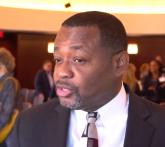Feature

VIDEO: Keep index of suspicion high for groups at risk of suicide and substance abuse
WASHINGTON – Suicides increased by 25% during 2000-2015, and opioid-related deaths have quadrupled since 1999, according to the most recent data...

AT AN EXPERT PANEL ON SUICIDE AND OPIOID DEATHS
When a medical disorder and its attendant comorbidities present a multifactorial etiology, the clinician must address the problem as a unit. This isn’t happening with suicide and drug overdose deaths, said Arthur C. Evans Jr, PhD, chief executive officer of the American Psychological Association.
“These conditions are tied to societal determinants, but our approach to them is still focused at the individual level,” said Dr. Evans. “As long as our primary way is to build treatment programs and expect people to find their way into them on their own, it’s not going to work. We know that 90% of patients with substance abuse problems don’t come to treatment. So, our strategy is missing a whole lot of people.”
A better way, he said, is to proactively provide holistic person-centered care. He has some very specific ideas, honed by his 12 years as commissioner of Philadelphia’s Department of Behavioral Health and Intellectual Disability Service, a $1.2 billion health care agency that is the safety net for 1.5 million Philadelphians with behavioral health and intellectual disabilities. Dr. Evans is credited with transforming the agency into a community-integrated, recovery-oriented treatment model.
He would like to see a similar national transformation in how at-risk groups are targeted, educated, screened, and treated. “We can create a culture where these issues are better understood by the public, so they can recognize problems early and connect to better health care.”
“Hope is at the center of our work,” Dr. Evans said. “The whole recovery movement has been about helping people have the hope that they can get better, that their lives can improve. Fundamentally, this must be the basis for treatment. We have focused for too long on the symptoms people bring to us, and missed the fact that these problems of suicide and drug abuse arise because people are hurting, both physically and psychologically. To recover, they need to believe there is a future in which they can feel better.”
But while thought leaders continue to fine-tune their message, people continue to die, Mr. Kennedy said.
“We have all the experts who know what to do; the thing that is missing is the political will to do it,” he noted. “It’s driven by the stigma, the silence of families suffering from these illnesses. If we can’t talk about it in our families, we can’t talk about it to our legislators, and if they don’t hear from us, they do nothing. We need a political answer, ultimately. We appropriated a billion dollars over 2 years for the opioid crisis, but within 3 days of Hurricane Harvey, we appropriated $15 billion. It may seem we are making progress because we have great forums, but it’s a lot of talk, and people are dying every day.”
He likened the suicide and opioid death crisis to a natural disaster that requires not just money, but a highly coordinated response that targets multiple impacted areas.
“We need a Federal Emergency Management Agency–like response to this,” Mr. Kennedy said. “FEMA is designed to address all the missing pieces necessary for someone to recover from a disaster. In recovery, we have a physical problem, a mental obsession, and a spiritual malady. People need medical help – access to medication to get their lives stabilized. They need the psychological component of cognitive behavioral therapy. And they need the spiritual angle, which is social support, people reaching out to each other.
“Right now, everyone thinks this is a problem to be dealt with ‘over there,’ but it isn’t,” he added. “It involves all of us, and if we want to put these communities back together, we need everyone energized and contributing.”

WASHINGTON – Suicides increased by 25% during 2000-2015, and opioid-related deaths have quadrupled since 1999, according to the most recent data...

Reaching people at risk of opioid abuse and suicide will require a shift beyond focusing on treating individuals.

Suicide prevention requires a multifaceted, comprehensive clinical effort, coupled with an equally comprehensive community effort.
